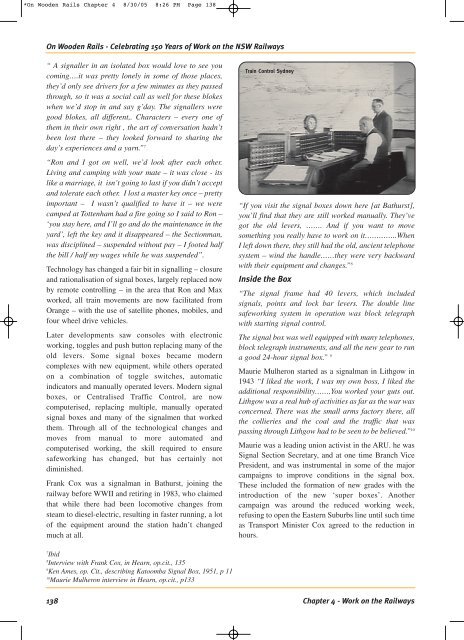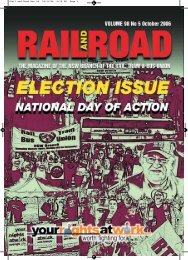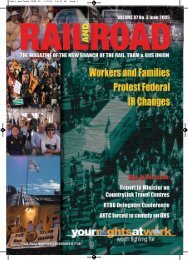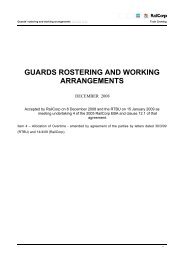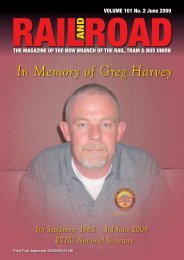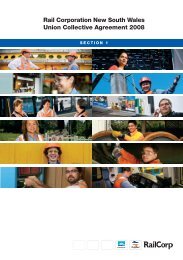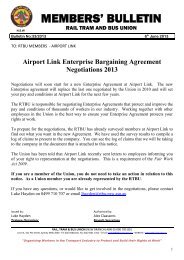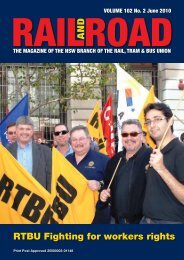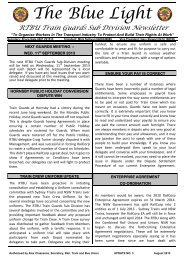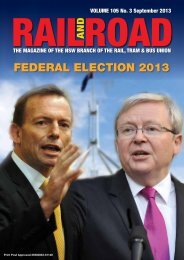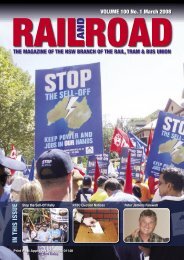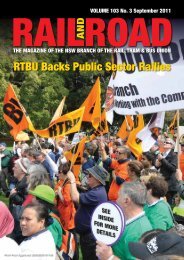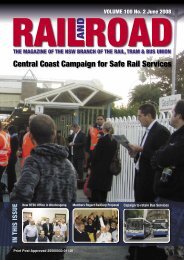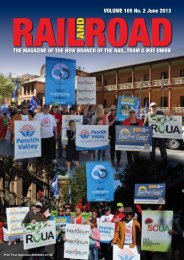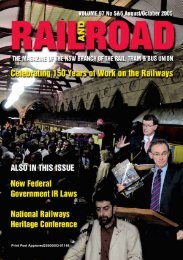Chapter 4 - Work on the Railways - Rail, Tram and Bus Union of NSW
Chapter 4 - Work on the Railways - Rail, Tram and Bus Union of NSW
Chapter 4 - Work on the Railways - Rail, Tram and Bus Union of NSW
You also want an ePaper? Increase the reach of your titles
YUMPU automatically turns print PDFs into web optimized ePapers that Google loves.
*On Wooden <strong>Rail</strong>s <str<strong>on</strong>g>Chapter</str<strong>on</strong>g> 4 8/30/05 8:26 PM Page 138<br />
On Wooden <strong>Rail</strong>s - Celebrating 150 Years <strong>of</strong> <str<strong>on</strong>g>Work</str<strong>on</strong>g> <strong>on</strong> <strong>the</strong> <strong>NSW</strong> <strong><strong>Rail</strong>ways</strong><br />
“ A signaller in an isolated box would love to see you<br />
coming….it was pretty l<strong>on</strong>ely in some <strong>of</strong> those places,<br />
<strong>the</strong>y’d <strong>on</strong>ly see drivers for a few minutes as <strong>the</strong>y passed<br />
through, so it was a social call as well for <strong>the</strong>se blokes<br />
when we’d stop in <strong>and</strong> say g’day. The signallers were<br />
good blokes, all different,. Characters – every <strong>on</strong>e <strong>of</strong><br />
<strong>the</strong>m in <strong>the</strong>ir own right , <strong>the</strong> art <strong>of</strong> c<strong>on</strong>versati<strong>on</strong> hadn’t<br />
been lost <strong>the</strong>re – <strong>the</strong>y looked forward to sharing <strong>the</strong><br />
day’s experiences <strong>and</strong> a yarn.” 7<br />
“R<strong>on</strong> <strong>and</strong> I got <strong>on</strong> well, we’d look after each o<strong>the</strong>r.<br />
Living <strong>and</strong> camping with your mate – it was close - its<br />
like a marriage, it isn’t going to last if you didn’t accept<br />
<strong>and</strong> tolerate each o<strong>the</strong>r. I lost a master key <strong>on</strong>ce – pretty<br />
important – I wasn’t qualified to have it – we were<br />
camped at Tottenham had a fire going so I said to R<strong>on</strong> –<br />
‘you stay here, <strong>and</strong> I’ll go <strong>and</strong> do <strong>the</strong> maintenance in <strong>the</strong><br />
yard’, left <strong>the</strong> key <strong>and</strong> it disappeared – <strong>the</strong> Secti<strong>on</strong>man,<br />
was disciplined – suspended without pay – I footed half<br />
<strong>the</strong> bill / half my wages while he was suspended”.<br />
Technology has changed a fair bit in signalling – closure<br />
<strong>and</strong> rati<strong>on</strong>alisati<strong>on</strong> <strong>of</strong> signal boxes, largely replaced now<br />
by remote c<strong>on</strong>trolling – in <strong>the</strong> area that R<strong>on</strong> <strong>and</strong> Max<br />
worked, all train movements are now facilitated from<br />
Orange – with <strong>the</strong> use <strong>of</strong> satellite ph<strong>on</strong>es, mobiles, <strong>and</strong><br />
four wheel drive vehicles.<br />
Later developments saw c<strong>on</strong>soles with electr<strong>on</strong>ic<br />
working, toggles <strong>and</strong> push butt<strong>on</strong> replacing many <strong>of</strong> <strong>the</strong><br />
old levers. Some signal boxes became modern<br />
complexes with new equipment, while o<strong>the</strong>rs operated<br />
<strong>on</strong> a combinati<strong>on</strong> <strong>of</strong> toggle switches, automatic<br />
indicators <strong>and</strong> manually operated levers. Modern signal<br />
boxes, or Centralised Traffic C<strong>on</strong>trol, are now<br />
computerised, replacing multiple, manually operated<br />
signal boxes <strong>and</strong> many <strong>of</strong> <strong>the</strong> signalmen that worked<br />
<strong>the</strong>m. Through all <strong>of</strong> <strong>the</strong> technological changes <strong>and</strong><br />
moves from manual to more automated <strong>and</strong><br />
computerised working, <strong>the</strong> skill required to ensure<br />
safeworking has changed, but has certainly not<br />
diminished.<br />
Frank Cox was a signalman in Bathurst, joining <strong>the</strong><br />
railway before WWII <strong>and</strong> retiring in 1983, who claimed<br />
that while <strong>the</strong>re had been locomotive changes from<br />
steam to diesel-electric, resulting in faster running, a lot<br />
<strong>of</strong> <strong>the</strong> equipment around <strong>the</strong> stati<strong>on</strong> hadn’t changed<br />
much at all.<br />
7 Ibid<br />
8 Interview with Frank Cox, in Hearn, op.cit., 135<br />
9 Ken Ames, op. Cit., describing Katoomba Signal Box, 1951, p 11<br />
10 Maurie Mulher<strong>on</strong> interview in Hearn, op.cit., p133<br />
138<br />
Train C<strong>on</strong>trol Sydney<br />
“If you visit <strong>the</strong> signal boxes down here [at Bathurst],<br />
you’ll find that <strong>the</strong>y are still worked manually. They’ve<br />
got <strong>the</strong> old levers, ……. And if you want to move<br />
something you really have to work <strong>on</strong> it…………..When<br />
I left down <strong>the</strong>re, <strong>the</strong>y still had <strong>the</strong> old, ancient teleph<strong>on</strong>e<br />
system – wind <strong>the</strong> h<strong>and</strong>le……<strong>the</strong>y were very backward<br />
with <strong>the</strong>ir equipment <strong>and</strong> changes.” 8<br />
Inside <strong>the</strong> Box<br />
“The signal frame had 40 levers, which included<br />
signals, points <strong>and</strong> lock bar levers. The double line<br />
safeworking system in operati<strong>on</strong> was block telegraph<br />
with starting signal c<strong>on</strong>trol.<br />
The signal box was well equipped with many teleph<strong>on</strong>es,<br />
block telegraph instruments, <strong>and</strong> all <strong>the</strong> new gear to run<br />
a good 24-hour signal box.” 9<br />
Maurie Mulher<strong>on</strong> started as a signalman in Lithgow in<br />
1943 “I liked <strong>the</strong> work, I was my own boss, I liked <strong>the</strong><br />
additi<strong>on</strong>al resp<strong>on</strong>sibility…….You worked your guts out.<br />
Lithgow was a real hub <strong>of</strong> activities as far as <strong>the</strong> war was<br />
c<strong>on</strong>cerned. There was <strong>the</strong> small arms factory <strong>the</strong>re, all<br />
<strong>the</strong> collieries <strong>and</strong> <strong>the</strong> coal <strong>and</strong> <strong>the</strong> traffic that was<br />
passing through Lithgow had to be seen to be believed.” 10<br />
Maurie was a leading uni<strong>on</strong> activist in <strong>the</strong> ARU. he was<br />
Signal Secti<strong>on</strong> Secretary, <strong>and</strong> at <strong>on</strong>e time Branch Vice<br />
President, <strong>and</strong> was instrumental in some <strong>of</strong> <strong>the</strong> major<br />
campaigns to improve c<strong>on</strong>diti<strong>on</strong>s in <strong>the</strong> signal box.<br />
These included <strong>the</strong> formati<strong>on</strong> <strong>of</strong> new grades with <strong>the</strong><br />
introducti<strong>on</strong> <strong>of</strong> <strong>the</strong> new ‘super boxes’. Ano<strong>the</strong>r<br />
campaign was around <strong>the</strong> reduced working week,<br />
refusing to open <strong>the</strong> Eastern Suburbs line until such time<br />
as Transport Minister Cox agreed to <strong>the</strong> reducti<strong>on</strong> in<br />
hours.<br />
<str<strong>on</strong>g>Chapter</str<strong>on</strong>g> 4 - <str<strong>on</strong>g>Work</str<strong>on</strong>g> <strong>on</strong> <strong>the</strong> <strong><strong>Rail</strong>ways</strong>


